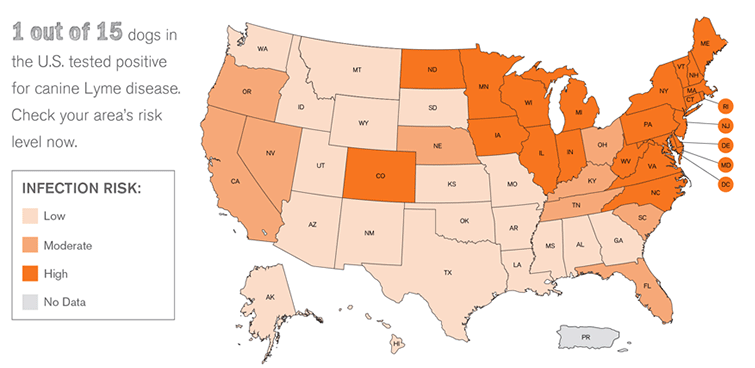LYME DISEASE 101
Lyme Disease
Lyme disease is a bacterial infection transmitted through tick bites, most commonly by the deer tick. Lyme disease affects dogs, cats, people, horses, birds, cattle, and wild animals. Although it affects a large group of animals, clinical signs are often observed only in dogs and humans. A complete veterinary examination along with blood tests is required for diagnosing Lyme disease.
Ticks are generally found in wooded areas. They are most active during the warm months. Pets should be examined daily for ticks. If ticks are found, they should be removed immediately. Unfortunately the ticks that carry Lyme disease are extremely small. The nymph stage of the deer tick is equivalent to the size of a pinhead. Very often, single nymphs or adult ticks are not seen.
Lyme Vaccine Schedule
The initial Lyme vaccine can be given during the puppy exams with a booster 2-4 weeks after:
- 1st Lyme – 12-14 weeks old
- 2nd Lyme – 16-18 weeks
- Annually thereafter
Prevention
Lyme Disease is extremely prevalent in Fairfax County. While we have one of the highest rates of Lyme infection in the country, it is preventable through a combination of regular tick checks by you, vaccination, annual blood testing, and a year-round preventative
- Using year-round flea/tick prevention. There is a misconception that ticks are not a concern during the wintertime, however ticks are indeed a year-round pest and in order for your dog to always be protected, year-round flea and tick prevention is recommended. There are several different products available right now, such as Simparica Trio, Nexgard and Frontline Gold.
- Vaccinating for Lyme Disease. While there is no vaccination for people, there is a vaccine for your canine companion. The initial vaccination must be boostered approximately 3 weeks after it is first given and then becomes a yearly vaccination. It is a highly efficacious vaccine in preventing the transmission of Lyme disease.
- Testing for tick-borne diseases yearly. The annual bloodwork that we recommend includes a Snap 4dx, which will test for Heartworms, but also Lyme Disease and two other tick-borne disease – Ehrlichia Canis and Anaplasma. If your dog has tests positive for Lyme Disease, our staff will discuss treatment options with you and determine what the best course of action is for your pet.
We highly recommend all of our canine patients be vaccinated against Lyme Disease. Remember, deer commonly roam in residential neighborhoods and yards, so even dogs that are mainly indoors can contract Lyme Disease when they’re out to go to the bathroom. Ask your Veterinarian about vaccinating your pet for Lyme Disease.
Symptoms
The most pronounced symptoms of Lyme disease are sore joints, a stiff gait, and lameness. The lameness is not always pronounced and often shifts from one leg to the other. Other symptoms include weight loss, fever, fatigue and swollen lymph glands.
Diagnosing Lyme Disease
A complete veterinary examination along with blood tests is required for diagnosing Lyme disease.





